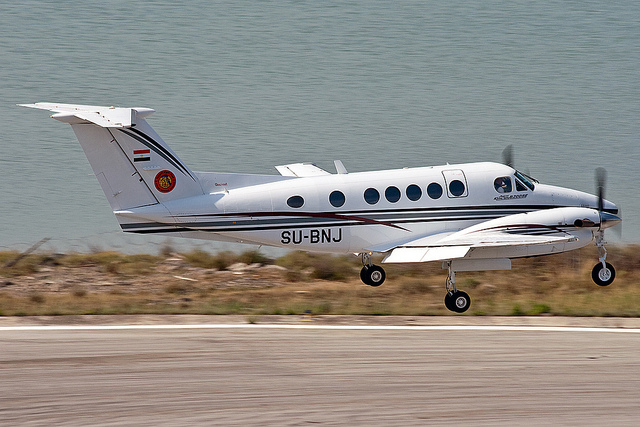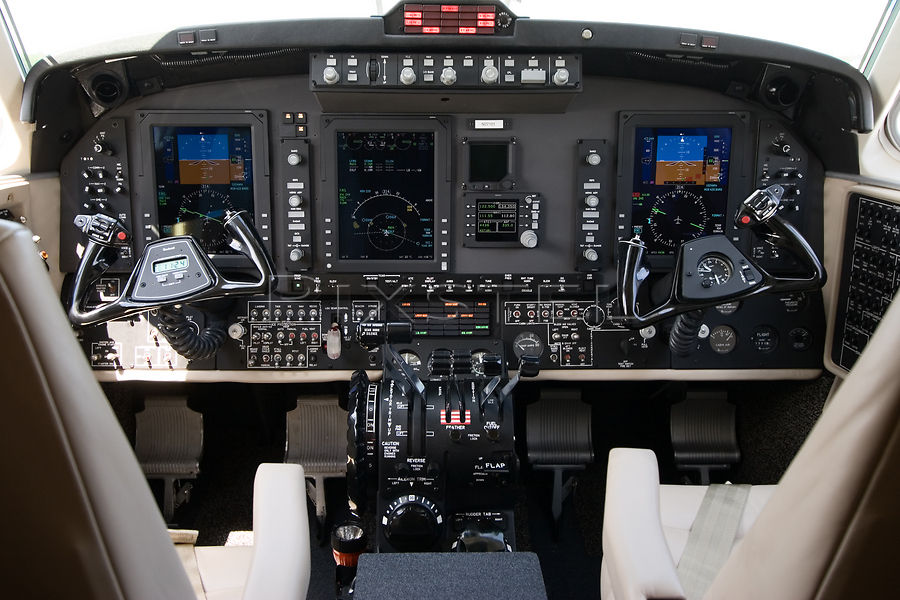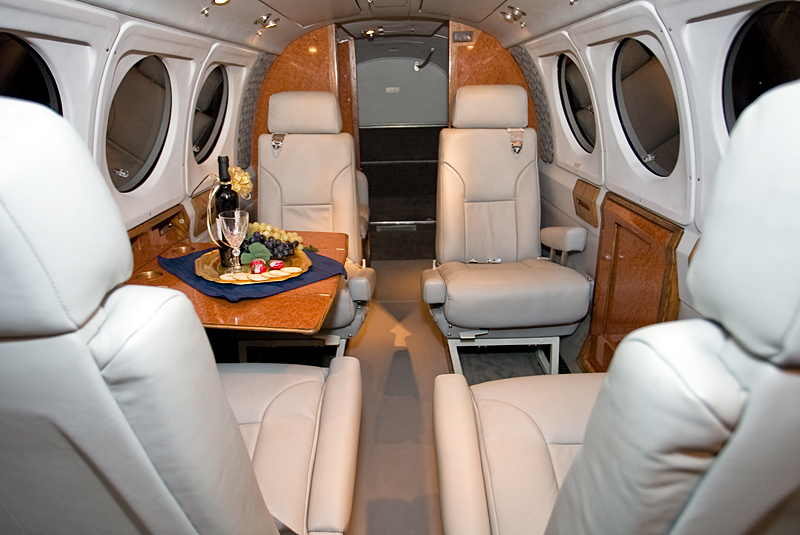


Aircraft Description
Background/History
In January 1964, the first Beechcraft 65-90 took to the air. Based on the piston-engined Model 65 Queen Air, the -90 featured the then-new Pratt & Whitney Canada PT6A turboprop powerplants in place of the earlier 65’s Lycoming flat-six piston engines. A pressurized model was developed, and was designated the King Air 90. Many variants followed, including the stretched King Air 100, and the further-stretched Super King Air 200 which was certificated in 1973. The Super King Air 200 had a greater wingspan, increased operating weights, increased fuel capacity, and also introduced the venerable T-tail now seen on all larger King Air models. In May 1980 the model B200, which featured the the PT6A-42 and increased cabin pressurization to 6.5 psi, went into production. The B200SE is a less costly version of the B200 due primarily to a less expensive panel-mounted, non-digital avionics package and, being less lavishly equipped, has about 430 lbs. greater useful load than the straight B200. Through 2000, a total of five were produced.
Power
The King Air B200SE is powered by a pair of Pratt & Whitney Canada PT6A-42 turboprop engines flat-rated at 850shp at ISA + 26C, each driving a McCauley four-bladed, full-feathering, reversible, constant-speed propeller. Inspection interval on the engines is 3,600 hours.
Avionics
The panel of the King Air B200SE is fitted with panel-mount radios and electromechanical instrumentation in lieu of the more costly EFIS equipment of the B200. Available equipment includes the Bendix/King CNI-5000 avionics suite with KFC-250 flight director/autopilot and RDS 81 color weather radar. Guages for gas generator and engine torque incorporate both digital and analog readouts.
Design Features
The King Air B200SE is a pressurized, twin-engine turboprop business aircraft configured as a cantilever low-wing monoplane with a T-tail and aft ventral fin. It has retractable tricycle landing gear with dual wheels on each unit. A large baggage area is located in the aft cabin and an airstair door is located aft of the wing on the port side of the fuselage. Raytheon engineers have taken measures to significantly reduce cabin noise levels in later model B200’s, from 1993 on, by utilizing smaller diameter four-bladed props with lower tip speeds. Thirty-two tuned dynamic vibration absorbers mounted at strategic points throughout the frame have reduced sound levels by as much as 5.4 dB in the center of the cabin and 15.8 dB in the cockpit.
Accomodations
Standard configuration of the King Air B200SE is for eight passengers in an arrangement with a club plus four individual seats. A ten-passenger configuration is available in which a two-place divan is located aft of the copilot seat, a single seat is behind the pilot’s position, a four-seat club is aft of those seats, and a lavatory seat and two fold-down seats occupy the aft cabin area. Cabin dimensions are 4.8ft. in height, 4.5ft. in width and 16.7ft. in length.
| General | King Air B200SE, BE-B200SE | |||
|---|---|---|---|---|
| Category | Multiengine Turboprop < 12,500 lbs. | |||
| Years Aircraft Manufactured | 1995 – 2000 | |||
| Serial Number Range | 1514 – 1779(various) | |||
| Retail High Price | $2,000,000.00 / 1,569,400.00€ | |||
| Retail Low Price | $1,910,000.00 / 1,498,777.00€ | |||
| Characteristics | King Air B200SE, BE-B200SE | |||
| Seating | 1+7/15 | |||
| Wing Loading | 41.3 | |||
| Power Loading | 7.3 | |||
| Noise(EPNdB): Takeoff/Sideline/Approach | 79.2 | |||
| External Dimensions (ft) | King Air B200SE, BE-B200SE | |||
| External Length | 43.8 | |||
| External Height | 14.8 | |||
| External Span | 54.5 | |||
| Internal Dimensions (ft) | King Air B200SE, BE-B200SE | |||
| Internal Length (Overall/Net Height) | 16.7/16.7 | |||
| Internal Height | 4.8 | |||
| Internal Width (Max/Floor) | 4.5/4.1 | |||
| Baggage | King Air B200SE, BE-B200SE | |||
| External: Cu.Ft./Lb. | N/A | |||
| External: Cu.Ft./Lb. | N/A | |||
| Power | King Air B200SE, BE-B200SE | |||
| Engines | 2 P&WC PT6A-42 | |||
| Output (lbs ea.)/Flat Rating | 850shp/ISA+26 | |||
| Inspection Interval | 3,600t | |||
| Data based on latest manufactured year | ||||



